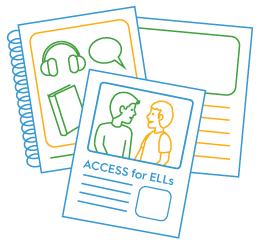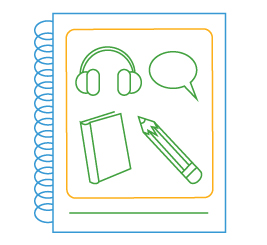Resources/Recursos
Featured Resources



All resources/Todos los recursos
Filter resources by:
Resources/Recursos
Making Connections (Washington)
Making Connections: Using the Washington State Early Learning and Development Guidelines and WIDA Early Years Resources to Plan Instruction for Young Multilingual Children is a comprehensive resource that offers suggestions, tools, and sample plans for teachers who use the Washington State Early Learning and Development Guidelines and WIDA resources to plan equitable learning opportunities for young multilingual children.
Resource Details View Download NowReleased September 2022
WIDA ELD Standards Framework, 2020 Digital Explorer
This website serves as a digital database of the WIDA English Language Development (ELD) Standards Framework. It categorizes Language Expectations in two ways: by ELD standard statement and grade-level cluster, and by Key Language Use and communication mode. Proficiency Level Descriptors (PLDs) can be explored by grade-level cluster and communication mode.
Resource DetailsReleased August 2022
Making Science Multilingual: Supporting Equity Through Design Principles
This Focus Bulletin emphasizes how multilingual learners' everyday language can be an asset to science teachers in their efforts to promote classroom engagement. It provides educators with real-world examples and guiding questions to help create learning spaces where sensemaking, co-construction, language development and equity can flourish simultaneously.
Published June 2022
Authors: Rita MacDonald, David Crowther, Jennifer Wilfrid
Released June 2022
Guiding Principles of Language Development Bibliography
Complete list of references cited in the WIDA Guiding Principles of Language Development.
Resource Details View Download NowReleased June 2022
Making Connections (Virginia)
Making Connections: Using the Virginia Early Learning and Development Standards and WIDA Early Years Resources to Plan Instruction for Young Multilingual Children is a comprehensive resource that offers suggestions, tools and sample plans for teachers who use the Virginia Early Learning and Development Standards and WIDA resources to plan equitable learning opportunities for young multilingual children.
Resource Details View Download NowReleased December 2021
Making Connections (New Mexico)
Making Connections: Using the New Mexico Early Learning Guidelines and WIDA Early Years Resources to Plan Instruction for Young Multilingual Children is a comprehensive resource that offers suggestions, tools, and sample plans for teachers who use the New Mexico Early Learning Guidelines and WIDA resources to plan equitable learning opportunities for young multilingual children.
Resource Details View Download NowReleased November 2021
Making Connections (Minnesota)
Making Connections: Using the Early Childhood Indicators of Progress: Minnesota’s Early Learning Standards and WIDA Early Years Resources to Plan Instruction for Young Multilingual Children is a comprehensive resource that offers suggestions, tools, and sample plans for teachers who use the Early Childhood Indicators of Progress: Minnesota’s Early Learning Standards and WIDA resources to plan equitable learning opportunities for young multilingual children.
Resource Details View Download NowReleased November 2021
WIDA ELD Standards Framework, 2020 Edition - Kindergarten Materials
This resource includes the Kindergarten materials that are part of the WIDA English Language Development Standards Framework, 2020 Edition. The materials specific to this grade level have been pulled together to provide educators of students in Kindergarten with a smaller, more manageable booklet to support their implementation of the WIDA ELD Standards Framework in their classroom.
Resource Details View Download NowReleased October 2021
WIDA ELD Standards Framework, 2020 Edition - Grade 1 Materials
This resource includes the grade 1 materials that are part of the WIDA English Language Development Standards Framework, 2020 Edition. The materials specific to this grade level have been pulled together to provide educators of students in grade 1 with a smaller, more manageable booklet to support their implementation of the WIDA ELD Standards Framework in their classroom.
Resource Details View Download NowReleased October 2021
WIDA ELD Standards Framework, 2020 Edition - Grades 2-3 Materials
This resource includes the grades 2-3 materials that are part of the WIDA English Language Development Standards Framework, 2020 Edition. The materials specific to this grade-level cluster have been pulled together to provide educators of students in grades 2-3 with a smaller, more manageable booklet to support their implementation of the WIDA ELD Standards Framework in their classroom.
Resource Details View Download NowReleased October 2021
WIDA ELD Standards Framework, 2020 Edition - Grades 4-5 Materials
This resource includes the grades 4-5 materials that are part of the WIDA English Language Development Standards Framework, 2020 Edition. The materials specific to this grade-level cluster have been pulled together to provide educators of students in grades 4-5 with a smaller, more manageable booklet to support their implementation of the WIDA ELD Standards Framework in their classroom.
Resource Details View Download NowReleased October 2021
WIDA ELD Standards Framework, 2020 Edition - Grades 6-8 Materials
This resource includes the grades 6-8 materials that are part of the WIDA English Language Development Standards Framework, 2020 Edition. The materials specific to this grade-level cluster have been pulled together to provide educators of students in grades 6-8 with a smaller, more manageable booklet to support their implementation of the WIDA ELD Standards Framework in their classroom.
Resource Details View Download NowReleased October 2021
WIDA ELD Standards Framework, 2020 Edition - Grades 9-12 Materials
This resource includes the grades 9-12 materials that are part of the WIDA English Language Development Standards Framework, 2020 Edition. The materials specific to this grade-level cluster have been pulled together to provide educators of students in grades 9-12 with a smaller, more manageable booklet to support their implementation of the WIDA ELD Standards Framework in their classroom.
Resource Details View Download NowReleased October 2021
Making Connections (Maryland)
Making Connections: Using the Maryland Early Learning Standards and WIDA Early Years Resources to Plan Instruction for Young Multilingual Children is a comprehensive resource that offers suggestions, tools, and sample plans for teachers who use the Maryland Early Learning Standards and WIDA resources to plan equitable learning opportunities for young multilingual children.
Resource Details View Download NowReleased September 2021
Making Connections (Wisconsin)
Making Connections: Using the Wisconsin Model Early Learning Standards and WIDA Early Years Resources to Plan Instruction for Young Multilingual Children is a comprehensive resource that offers suggestions, tools, and sample plans for teachers who use the Wisconsin Model Early Learning Standards and WIDA resources to plan equitable learning opportunities for young multilingual children.
Resource Details View Download NowReleased September 2021
Making Connections (Illinois)
Making Connections: Using the Illinois Early Learning and Development Standards and WIDA Early Years Resources to Plan Instruction for Young Multilingual Children is a comprehensive resource that offers suggestions, tools, and sample plans for teachers who use the Illinois Early Learning and Development Standards and WIDA resources to plan equitable learning opportunities for young multilingual children.
Resource Details View Download NowReleased August 2021
Making Connections (Alabama)
Making Connections: Using the Alabama Early Learning and Development Standards and WIDA Early Years Resources to Plan Instruction for Young Multilingual Children is a comprehensive resource that offers suggestions, tools, and sample plans for teachers who use the Alabama Early Learning and Development Standards and WIDA resources to plan equitable learning opportunities for young multilingual children.
Resource Details View Download NowReleased August 2021
Making Connections (Connecticut)
Making Connections: Using the Connecticut Early Learning and Development Standards and WIDA Early Years Resources to Plan Instruction for Young Multilingual Children is a comprehensive resource that offers suggestions, tools, and sample plans for teachers who use the Connecticut Early Learning and Development Standards and WIDA resources to plan equitable learning opportunities for young multilingual children.
Resource Details View Download NowReleased August 2021
What can collaboration look like with the WIDA ELD Standards Framework?
Collaboration is one of the four Big Ideas of the WIDA ELD Standards Framework. This two-page "comic" strip shows the story of how a science teacher and an ESL teacher work together on their multilingual learners' language development and ways of meaningfully engaging with the content of a science unit. This step-by-step example can be used in tandem with Section 4 of the WIDA ELD Standards Framework, 2020 Edition, that has a more detailed look at the collaborative planning process.
Resource Details View Download NowReleased July 2021
Putting It All Together: Next Steps for Using the 2020 Edition
In this webinar, the WIDA standards development team discusses and models the tools, provided in the 2020 Edition, for initiating critical conversations with school leaders and colleagues.
Resource DetailsReleased March 2021




